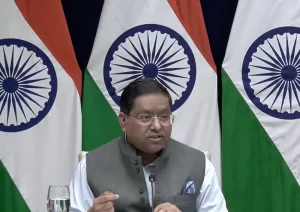India Denies Allegations of Ammunition Transfers to Ukraine
3 min read

India has firmly rejected a recent news report alleging that the government failed to prevent the transfer of Indian-made artillery shells to Ukraine by European buyers. The report, published by Reuters, claimed that artillery shells sold by Indian manufacturers had been redirected to Ukraine without India’s knowledge or consent.
The article suggested that this diversion of ammunition has been ongoing for over a year, asserting that the Indian government took no action to halt these transfers despite multiple protests from Russia. In response, India’s Ministry of External Affairs labeled the report as “speculative” and “misleading.” Randhir Jaiswal, a spokesperson for the ministry, criticized the allegations on X (formerly Twitter), stating that they inaccurately imply violations by India where none exist.
Jaiswal emphasized that India maintains an “impeccable track record” in complying with international non-proliferation obligations and has established stringent export regulations. These regulations dictate that arms are to be used only by the designated buyers, and any unauthorized transfers could jeopardize future sales agreements. In May, India announced a tightening of these export rules, requiring that buyers ensure the arms do not reach third-party nations.
Ukraine is currently facing a significant shortage of artillery ammunition amid its ongoing conflict with Russia, which has intensified recently. The Reuters report cited unnamed officials from Indian and European governments, along with customs data, indicating that India produces only a small fraction of the ammunition used by Ukraine—estimated to be less than 1% of the total arms imported since the war began in 2021. Among the countries allegedly sending Indian ammunition to Ukraine are Italy and the Czech Republic.
The report also mentioned that Russia has raised concerns with India regarding this issue on at least two occasions, including during a meeting between the foreign ministers of both nations in July. Despite these tensions, India has refrained from openly criticizing Russia over the conflict, which has led to dissatisfaction among Western nations.
India has consistently highlighted the importance of respecting the territorial integrity and sovereignty of all nations and has advocated for diplomatic solutions to the ongoing conflict. Historically, India and Russia have enjoyed strong relations, with Moscow being a crucial trade and defense partner for New Delhi, especially in light of Western sanctions imposed on Russia.

In 2022, Russia emerged as India’s largest oil supplier, and in the defense sector, it remains India’s most significant ally, providing over 60% of the country’s military needs. This relationship was underscored in July when Indian Prime Minister Narendra Modi made his first bilateral visit to Russia since being elected for a third term. During this visit, he referred to President Vladimir Putin as a “dear friend.”
However, Modi’s visit to Russia drew criticism from Ukrainian President Volodymyr Zelensky, who expressed disappointment at seeing the leader of the world’s largest democracy engaging with what he described as a “bloody criminal” in Moscow. Just weeks later, Modi visited Ukraine and held discussions with Zelensky, an act that analysts interpreted as consistent with India’s long-standing policy of non-alignment in global geopolitics.
As the situation in Ukraine continues to develop, India’s balancing act between maintaining strong ties with Russia and responding to Western concerns is likely to remain a focal point of its foreign policy. While India asserts its commitment to international norms regarding arms exports, the complexities of its relationships with both Russia and Western nations underscore the challenges it faces on the global stage.